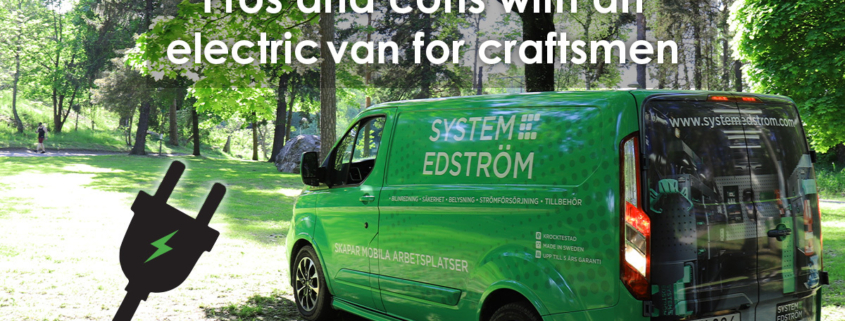Pros and cons with an electric van for craftsmen
The interest in electric van has increased significantly in recent years, partly due to an increased environmental awareness among the public and partly due to the fact that the range, price and performance of electric vans have improved quite significantly. It is now both practically and financially defensible for a lot of us to get an electric van, but what is it like for craftsmen?
Environmental friendly
One should not underestimate the fact that the biggest advantage of having an electric van instead of a traditional van, is the environmental benefits. It can ease your own environmental conscience as well as it is something that is becoming more and more important for your customers. A lot of customers prefer to hire companies that they know are taking responsibility for the environment, so by getting an electric van you get an advantage over your competitors who still run on petrol or diesel. However, there are still not many of us who want bragging rights from customers over practical and economic possibilities. So how reasonable is it really for you as a craftsman to get an electric van?
Is an electric van a good idea for you?
In short, it can be said that if you primarily move in an urban environment and have the opportunity to charge the van at home – either by installing a charging box in your garage or in the driveway, or if you apartment complex has its own charging stations – it can make both practical and economical sense for you to get an electric van.
Depending on which model you have, you can count on a range of 100 km for some electric vans and 200 km for others. So before you start thinking about which model is best for you, it is a good idea to keep a log on how far you drive every day.
A lot of models also have fast charging which allows you to charge the battery up to 80% in under an hour, so if you know that there are lunch or coffee places around your work that offer fast charging, that is also worth taking into consideration.
Economic aspects
What about the economy? Electric vans are normally slightly more expensive than the corresponding traditional alternative, but they are definitely cheaper to both own and drive. Electricity as fuel is much cheaper than petrol and diesel, electric vans require significantly less maintenance because of the electric motor that has fewer moving parts that can break, and you also get an environmental bonus of up to £7 000 when buying an electric van. Also the vehicle tax is much lower…
Pros and cons
All in all, it can be said that the pros and cons of having an electric van as a craftsman is:
Cons:
- You need to make sure that you have places to charge the van
- You can not drive more than 100-200 km between charges, depending on the model
- More expensive to buy
Pros:
- Better for the environment (which a lot of customers appreciate)
- Lower operating costs and taxes
- Needs less maintenance and service
- Is allowed in environmental zones in cities
- Less noise
- Fast acceleration
Which electric van should you get?
This is a selection of suitable options for the craftsmen who wants to get an electric van:
- Renault Kangoo Z.E
- Nissan e-NV200
- Opel Vivaro-e
- Mercedes eVito
- Volkswagen e-Caddy
- Volkswagen e-Crafter
- Volkswagen e-Transporter
All of these are excellent options for all types of craftsmen with different strengths and weaknesses. All of them are also compatible with System Edström’s van racking.







